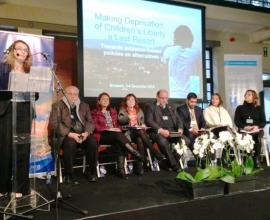A Latin American delegation participates in the Sixth Conference of the International Juvenile Justice Observatory (IJJO)
The mission organised by EUROsociAL included a study visit to the United Kingdom and the Netherlands to learn about European juvenile justice systems
During the week of the Sixth Conference of the IJJO, a Latin American delegation undertook a study visit to the United Kingdom and the Netherlands to learn about different European juvenile justice systems and best practices in the administration of juvenile justice and the use of alternatives to detention such as restorative justice. At the same time, the activity organised by the EUROsociAL cooperation programme of the European Commission , through the IJJO, also sought to introduce and provide training on modern concepts in the administration of juvenile justice and theoretical frameworks that could be developed and implemented in Latin America.
The Latin American delegates also participated in the Sixth Conference of the IJJO in Brussels through the establishment of a roadmap for 2015, a meeting to bring up juvenile justice demands with the IJJO and the EUROsociAL programme, also represented by FEI, the coordinating partner for Justice and Citizen Security. This year's conference was held under the title "Making Deprivation of Children’s Liberty a Last Resort: Towards evidence-based policies on alternatives".
The conference provided the opportunity to analyse in depth the alternatives to deprivation of liberty and the implementation of better strategies of restorative juvenile justice. Different proposals for legal reforms were addressed, as well as how to orient interventions towards the best interest of the child and the specific needs of each young person or adolescent, according to models based on empirical evidence.
The Sixth International Conference was held under the High Patronage of Her Majesty The Queen of the Belgians, with sponsorship by UNESCO, the European Parliament and the Belgian Ministry of Justice. Financial support was provided by the EUROsociAL II cooperation programme of the European Commission, the "Fundamental Rights and Citizenship" programme, and the European Union's Justice Programme.
OIJJ

